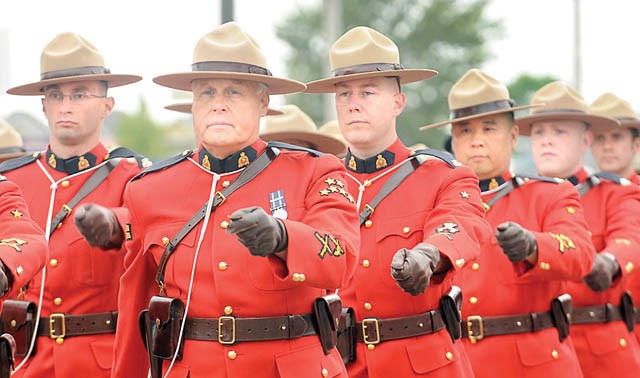The Supreme Court handed down a ruling Friday that will put all B.C. police, regardless of whether they work for the RCMP or municipal forces, on equal footing in terms of their ability to collectively negotiate their wages and working conditions, the head of the B.C. Police Association, Tom Stamatakis, said.
The Supreme Court of Canada says the Mounties have the right to engage in meaningful collective bargaining, but has not explicitly stated that they have the right to form a union.
Richmond Mayor Malcolm Brodie, however, said he is worried the ruling will raise the cost of policing in municipalities without their own forces.
"When I hear that this ruling may lead to ... increases in salary and wages, when I hear that it could change working conditions, when it could affect the equipment that is provided, the kind of training that is given, those are all very expensive things and contribute to the cost of our policing in a most untenable fashion," he said.
"We have been reviewing our long-term policing situation for some time and certainly the advantage that is always given to us for the RCMP over local forces is that of cost, that it's a costeffective alternative, and this directly will diminish that argument by adding to the cost."
What the Supreme Court decision results in is that RCMP officers themselves, said Stamatakis, “get to decide what issues are important to them and what are not and then how they want to address those issues, whereas historically they've really not had the ability to do that to the same extent that other police organizations have had."
The 6-1 ruling gives the federal government a year to create a new labour relations scheme, setting the stage for talks among RCMP members, Commissioner Bob Paulson and Public Safety Minister Steven Blaney.
The high court overturned its previous ruling from the 1990s that upheld an exclusion barring the Mounties from forming unions like federal public servants, who gained the right to collective bargaining in the late 1960s.
The court says overturning its precedent "is not a step to be lightly taken," but in this case it was justified because case law has evolved since it ruled in 1999 and it was dealing with a narrower issue at that time.
The latest judgment was written by Chief Justice Beverley McLachlin and Justice Louis LeBel, and will ultimately affect officers across the country.
The case is a major win for RCMP members.
"Today is an awesome day for all members in the RCMP," said Ray Banwarie, president of the Mounted Police Professional Association of Canada.
Compensation for RCMP officers has, in recent years, fallen below what municipal officers earn, Stamatakis said.
"There's no question that if an RCMP officer is working in a municipality in British Columbia doing the same work as a police officer working in Vancouver or New Westminster or Port Moody, I'm sure they're wondering why they aren't being paid the same, given that they're working in the same region, dealing with the same kind of crime issues and the same cost of living issues."
That said, it is not immediately apparent that the court's decision will have any effect on wages and benefits, Stamatakis said. As always, municipalities will decide whether to contract the RCMP or use their own municipal police forces.
"If the implication is that they're saving a significant amount of money by using the RCMP because they're understaffing or not providing the appropriate working conditions for those RCMP officers working in those communities, then ... that's not something that I have a lot of empathy for and I'm not sure that the public will, either."
City of North Vancouver Mayor Darrell Mussatto said he feels RCMP should be paid the same as their municipal counterparts.
"We've been anticipating the potential (pay) increase ... (with) the collective bargaining. We have a very talented and very dedicated force here. If the cost did rise more than we had anticipated, we certainly would want to keep the RCMP."
For more stories, go to vancouversun.com



